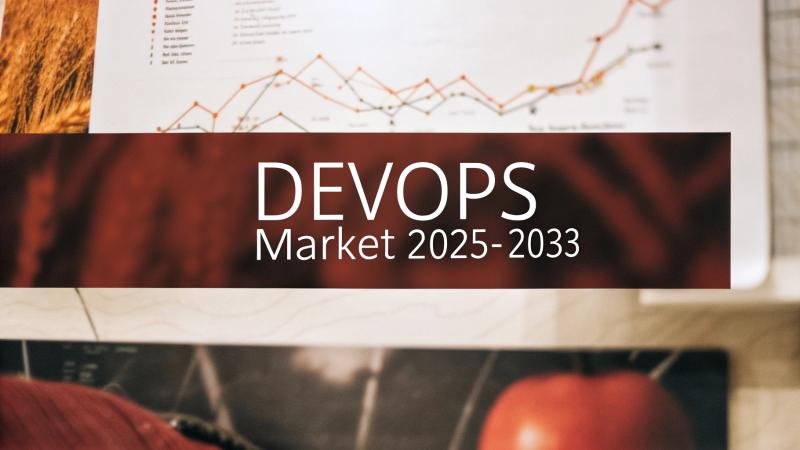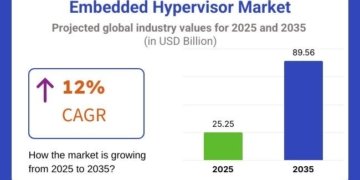According to the latest report by IMARC Group, titled “DevOps Market Size, Share, Trends and Forecast by Type, Deployment Model, Organization Size, Tools, Industry Vertical, and Region, 2025-2033”, offers a comprehensive analysis of the industry, which comprises insights on the global DevOps Market. The report also includes competitor and regional analysis, and contemporary advancements in the global market.
The global DevOps market size was valued at USD 13.16 Billion in 2024. Looking forward, the market is projected to reach USD 81.14 Billion by 2033, growing at a CAGR of 19.95% from 2025-2033. North America currently dominates the market, holding a market share of over 37% in 2024. The shifting preferences from traditional data centres to hybrid systems, the increasing focus on automating business processes across various industries, and the rising demand for serverless computing represent some of the major determinants fueling the DevOps market share.
Request Free Sample Report: – https://www.imarcgroup.com/devops-market/requestsample
Global DevOps Market Dynamics:
Accelerating Cloud Adoption Fueling DevOps Implementation
The fact that cloud computing has gained popularity in most industries and is spreading at a rapid pace is a key factor that is currently fueling the development of the global DevOps market. The transfer of workloads to the cloud public, privately, and hybrid is on the rise and the DevOps has the tools and processes to help organizations to manage the transfer. AWS, Azure, and Google Cloud infrastructures have built-in DevOps capabilities, continuous integration, continuous delivery (CI/CD), automated infra provisioning, etc.
Such a marriage between cloud services and DevOps tools increases scalability, shortens software release cycles, and decreases time-to-market of digital products. DevOps is being adopted by businesses that aim to be flexible and adapt quickly to the dynamic situation in the market where there is a need to innovate faster in a manner that maintains system stability by facilitating improved collaboration between the development and operations teams.
Also, cloud-native DevOps enables enterprises to solve complicated issues like microservices orchestration, container management, and multi-cloud strategies, and in that regard, DevOps becomes an essential part of a cloud infrastructure. The need of integrated DevOps solutions is likely to increase tremendously as the adaption of cloud continues to grow globally and the adoption of cloud knowledge is mostly among smaller and medium sized enterprise as well as digital first startups. The need of business continuity, remote development environment and flexible IT infrastructures is also a significant feature of DevOps implementation, and this trend is further enhancing since all these are core products of successful DevOps implementation.
Rising Need for Agile and Automated Software Development
One of the main market drivers of the global DevOps market is the increased tendency of the need of the faster, mobile and mistake-free software development. The conventional software development paradigm tends to be characterized with silo work, lengthy development processes and numerous slips in delivery. DevOps, on the contrary, introduces a culture of a collaborative environment, continuous improvement, and automation, which allow organizations to position development with operational objectives and become more efficient. DevOps is all about automation, which turns into testing, deployment, configuration, and monitoring.
This automated process limits human intervention, improves human error as well as speedily deploys the product thus improving the quality of the product and customer satisfaction. The agile methodology in conjunction with the DevOps practices guarantees the ability of the development teams to rapidly address the market feedback, resolve issues within a short period, and release them with uninterrupted updates. The IT infrastructures are also becoming complex, and a lot of applications are now being developed on many platforms; this is also necessitating the use of DevOps to manage dependencies and ensure consistencies in the manner in which the apps perform.
The companies of various industries like BFSI, healthcare, retail, manufacturing are adapting the DevOps tools like Jenkins, GitLab, Docker, and Kubernetes to enhance their productivity and more resilient operations. Given the further progress of the digital transformation journey, the necessity to continuously innovate and address the ever-changing customer needs will only speed up the process of DevOps adoption across the globe.
Integration of AI and Machine Learning in DevOps Practices
Incorporation of artificial intelligence (AI) and machine learning (ML) in DevOps practice is a revolutionary trend that is changing the global landscape of the DevOps industry. AI enabled DevOps is commonly referred to as AIOps and augments automation, predictive analysis, and intelligent decision-making intrinsic to the software development life cycle. With the exception of application logs, performance metrics, and user interaction, AI algorithms can investigate huge amounts of data to detect anomalies, Out-of-skill application prediction along with choosing proactive solutions.
This minimises downtimes in addition to allowing real-time treatment of incidents together with real-time repair of IT processes. Machine learning algorithms can predict usage of resources, automate testing processes as well as personal experiences of users based on behavioral analytics. Furthermore, AI can be used to make CI/CD pipelines much smoother, ensuring the maximum effectiveness of the code, reviewing it, detecting possible vulnerabilities in it at an early stage, and ensuring a high rate of deployment. Implementing AI in DevOps processes, companies can exclude much of the mental pressure on programmers and operations staff and enhance the integrity and security of software. The increased access to AI-enabled
DevOps tools, along with the development of natural language processing and robotic process automation (RPA) is making it more convenient to implement intelligent devops practices into business. This trail is especially applicable in large scaled, enterprise level systems a system that requires more intelligent automated systems given the complexity of the system and the amount of data it deals with. With enterprises becoming more data-centric and resilient, the harmonization of AI and DevOps will be one of the key factors that determine the future environment of agile and intelligent software delivery eco-systems.
By the IMARC Group, Some of the Top Competitive Landscape Operating in the DevOps Market Report are Given Below:
• IBM Corporation
• Microsoft Corporation
• Oracle Corporation
• CA Technologies
• Google LLC
• Cisco Systems
• Amazon Web Services
• Cigniti Technologies Ltd.
• Hewlett Packard Enterprise Company
• EMC Corporation
• VersionOne, Inc.
• Micro Focus International PLC
• Puppet, Inc.
• Red Hat, Inc.
• GitLab, Inc.
• Progress Chef Software Corporation
• Docker Inc.
• Atlassian Corporation PLC
(Please note that this is only a partial list of the key players, and the complete list is provided in the report.)
Full Access and Buy Now: – https://www.imarcgroup.com/checkout?id=1546&method=1670
Global DevOps Market Trends:
The worldwide DevOps market is being affected by a healthy change caused by the combination of digital innovation, cloud computing, and the necessity to maintain continuous provision of software of superior quality. DevOps has become one of the mainstays of a digital-first approach to business, agile development, and operational effectiveness as business leaders develop their applications and operations. One of the main trends that are affecting the market is the increased adoption of platform engineering and infrastructure as code (IaC) that enables teams to construct scalable, consistent and repeatable environments within the multi-cloud ecosystem.
At the same time, the popularity of the microservices architecture and containerization, which is facilitated by such tools as Docker and Kubernetes, urges organizations to switch to DevOps as a response to the complex deployments. Another trend is security tiered integration into DevOps pipeline, or DevSecOps, where the main idea is to implement compliance and application integrity protection at their initial stage. In addition, low code and no code DevOps tools are democratizing software development because non-technical users now have an opportunity to effectively contribute to the application delivery.
This is pushing democratization, which improves the degree of cross-function applications and increases the DevOps users beyond the IT departments. One of the reasons as to why enterprises are investing in DevOps is to enhance time-to-market, minimize operation risk, and enable enterprise innovation. With the rapidly increasing rate in technological change the DevOps industry is anticipated to develop at a fast rate which will be aided by strategic tie ups and mergers and acquisition between prominent players. Those changes are what make the use of DevOps so critical in helping organizations of all industries create agile, safe, and smart IT environments.
DevOps Market Segmentation:
Analysis by Type:
• Solutions
• Services
Solution leads the market with around 68.4% of market share in 2024.
Analysis by Deployment Model:
• Public Cloud
• Private Cloud
• Hybrid Cloud
Public cloud leads the market with around 47.6% of market share in 2024.
Analysis by Organization Size:
• Large Enterprises
• Medium-Sized Enterprises
• Small-Sized Enterprises
Large enterprises lead the market with around 49.4% of market share in 2024.
Analysis by Tools:
• Development Tools
• Testing Tools
• Operation Tools
Development tools lead the market with around 45% of market share in 2024.
Analysis by Industry Vertical:
• Telecommunications and Information Technology
Enabled Services (ITES)
• Banking, Financial Services, and Insurance (BFSI)
• Retail
• Manufacturing
• Healthcare
• Government and Public Sector
• Others
Telecommunications and information technology enabled services (ITES) leads the market with around 35.7% of market share in 2024.
Regional Analysis:
• North America
• Europe
• Asia Pacific
• Middle East and Africa
• Latin America
In 2024, North America accounted for the largest market share of over 37%.
Key highlights of the Report:
• Market Performance
• Market Outlook
• COVID-19 Impact on the Market
• Porter’s Five Forces Analysis
• Historical, Current and Future Market Trends
• Market Drivers and Success Factors
• SWOT Analysis
• Structure of the Market
• Value Chain Analysis
• Comprehensive Mapping of the Competitive Landscape
Note: If you need specific information that is not currently within the scope of the report, we can provide it to you as a part of the customization.
IMARC Group
134 N 4th St. Brooklyn, NY 11249, USA
Email: sales@imarcgroup.com
Tel No:(D) +91 120 433 0800
United States: +1-631-791-1145
IMARC Group is a leading market research company that offers management strategy and market research worldwide. We partner with clients in all sectors and regions to identify their highest-value opportunities, address their most critical challenges, and transform their businesses.
IMARC’s information products include major market, scientific, economic and technological developments for business leaders in pharmaceutical, industrial, and high technology organizations. Market forecasts and industry analysis for biotechnology, advanced materials, pharmaceuticals, food and beverage, travel and tourism, nanotechnology and novel processing methods are at the top of the company’s expertise.
This release was published on openPR.

















